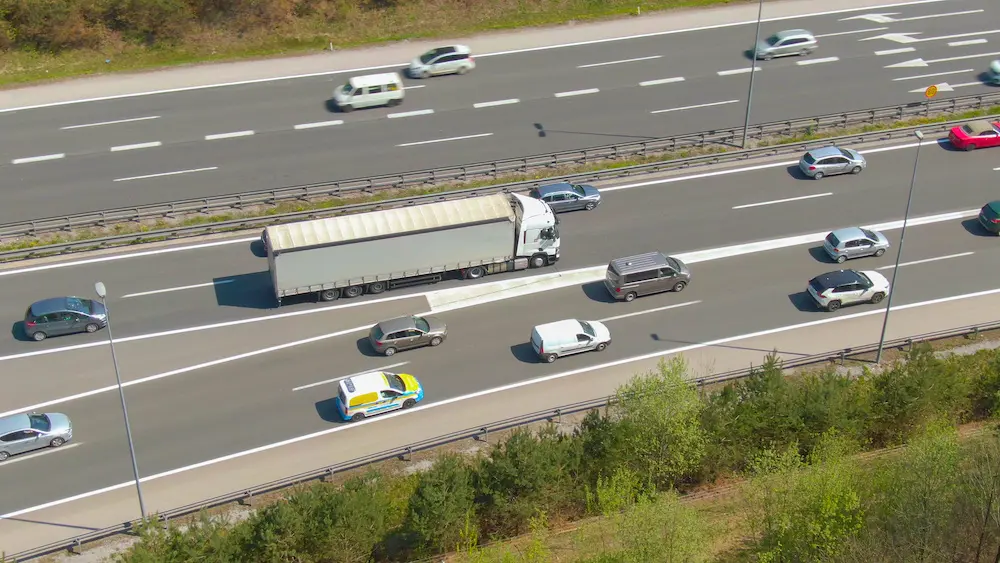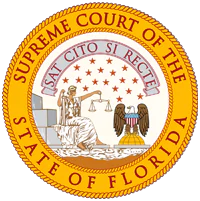Florida Truck Accident Attorneys
Due to the state’s dense traffic and major trucking routes, truck accidents are a significant concern on Florida’s roadways. These incidents often involve 18-wheelers, which, due to their massive size and weight, can cause severe injuries and extensive property damage when collisions occur. The impact of truck accidents extends beyond immediate physical harm, affecting the lives of victims and their families profoundly.
At Schrier Law Group, we’ve dedicated 37 years to personal injury law in Florida, navigating the legal system in Florida and advocating for the rights of the injured. Our extensive experience across decades underscores our commitment to justice and excellence in legal representation.
We specialize in truck accident cases, recognizing the devastating impact these incidents can have on victims. Our expertise is in pursuing justice and understanding the complexities of truck accident claims, from intricate federal and state regulations to the aggressive defense strategies often employed by trucking companies. Our commitment is to provide legal representation and a pathway to recovery and success for our clients, ensuring they receive the compensation and support they deserve.
Understanding Truck Accidents in Florida
In Florida, the prevalence and impact of truck accidents are significant, given the state’s major transportation routes and economic reliance on trucking. The size and operating standards of 18-wheelers introduce specific complexities in accident cases, including severe consequences in terms of injuries and damages. Key causes of these accidents encompass a range of factors, from driver error, such as fatigue and distraction, to mechanical failures and regulatory non-compliance.
Given these complexities, expert legal representation is crucial. Specialized attorneys understand the nuances of trucking regulations and can navigate the intricate legal landscape, ensuring that victims receive comprehensive advocacy and are justly compensated for their losses.
Florida Laws and Truck Accidents
Florida’s state laws concerning truck accidents include various statutes governing commercial truck operation and insurance requirements. For instance, the state enforces particular safety standards and insurance minimums that exceed those for personal vehicles. These laws determine liability and compensation in truck accident cases, affecting how damages are assessed and claims are pursued.
Florida Commercial Vehicle Weight Restrictions
Florida law limits the weight of commercial vehicles based on the number of axles and axle spacing. For instance, an 18-wheeler typically cannot exceed 80,000 pounds without a special permit.
Florida Commercial Driver License (CDL) Requirements
Drivers of commercial vehicles, including 18-wheelers, must possess a CDL. Florida mandates specific commercial vehicle and cargo endorsements, with additional testing and certification requirements.
Vehicle Inspection and Maintenance
Commercial vehicles in Florida must undergo regular inspections and maintenance to ensure they meet safety standards. This includes checking brakes, tires, lights, and other critical components to prevent malfunctions that could lead to accidents.
Impact on Legal Strategy
Understanding Florida’s state laws allows attorneys to accurately evaluate a trucking company’s or driver’s compliance with local regulations, which can be pivotal in establishing fault and pursuing rightful compensation for accident victims.
Federal Regulations and Truck Accidents
On the federal level, the FMCSA sets out comprehensive regulations that impact truck drivers and companies nationwide, including hours of service limitations, maintenance and inspection requirements, and load-securing standards. Compliance with these regulations is mandatory, and violations can significantly influence liability in truck accident cases.
Federal Hours of Service (HOS) Regulations
- Daily Driving Limits: Truck drivers are limited to 11 hours of driving time after 10 consecutive hours off duty.
- Rest Breaks: Drivers must take a 30-minute break if they have driven for 8 cumulative hours without at least a 30-minute interruption.
- Weekly Limits: The 60/70-hour limit applies in 7/8 consecutive days, meaning a driver cannot drive after 60/70 hours on duty in 7/8 consecutive days.
Federal Drug and Alcohol Testing
Truck drivers are subject to drug and alcohol testing in various situations such as pre-employment, randomly while employed, post-accident, and if there’s reasonable suspicion of use.
Load Securement Regulations
Both federal and state regulations specify how cargo should be secured on commercial vehicles. These rules ensure that loads are adequately restrained to prevent shifting or falling, which could lead to accidents or road hazards.
Compliance with Electronic Logging Devices (ELD)
Federal regulations require using ELDs to accurately record hours of service, ensuring compliance with HOS regulations. ELDs help enforce rest requirements and reduce the risk of driver fatigue-related accidents.
Legal Process in Truck Accident Lawsuits: From Start to Finish
Initiating a truck accident lawsuit in Florida involves a series of steps, from the initial filing to the resolution of the case. Here’s an overview of the legal process:
1. Consultation and Case Evaluation
The process typically begins with a consultation between the victim or their family and one of our truck accident lawyers. During this meeting, the attorney assesses the details of the case, including the extent of injuries, property damage, and potential liability factors. Based on this evaluation, the attorney advises the client on the viability of pursuing legal action.
2. Filing the Complaint
If the attorney decides to proceed with a lawsuit, he or she files a complaint in the appropriate Florida court. This document outlines the plaintiff’s allegations against the defendants, who may include the truck driver, trucking company, vehicle manufacturers, and other potentially liable parties.
3. Discovery Phase
Once the complaint is filed, both parties engage in the discovery process. This phase involves exchanging information relevant to the case, such as witness statements, accident reports, medical records, and other evidence. Depositions may also be conducted, during which witnesses and parties involved in the accident provide sworn testimony.
During the discovery phase, attorneys work diligently to gather evidence establishing liability for the truck accident. This may include obtaining accident reconstruction reports, analyzing electronic logging device data from the truck, and examining maintenance records. Additionally, expert witnesses such as accident reconstruction specialists and medical professionals may be consulted to provide testimony regarding the cause of the accident and the extent of the injuries suffered by the victim.
4. Pre-Trial Motions and Settlement Negotiations
Before the trial date, the parties may file pre-trial motions to address legal issues or seek dismissal of certain claims. Additionally, settlement negotiations often occur during this phase, as parties attempt to resolve the case without going to trial. Attorneys on both sides negotiate settlement terms, including compensation for the plaintiff’s injuries and damages.
5. Trial
The case proceeds to trial if a settlement cannot be reached. Both parties present evidence during the trial, call witnesses, and argue before a judge and/or jury. The plaintiff must prove the defendant’s negligence and liability for the accident and the extent of the damages suffered. The trial concludes with a verdict, either in favor of the plaintiff or the defendant.
6. Post-Trial Proceedings
After the trial, the losing party may have the option to appeal the verdict if they believe legal errors occurred during the trial process. Appeals are heard by higher courts, which review the case for errors of law or procedure. If no appeal is filed, or if the appeal is unsuccessful, the verdict becomes final, and the case moves into the enforcement phase.
7. Enforcement of Judgment
If the plaintiff prevails at trial or through settlement, the next step is to enforce the judgment and collect the awarded damages. This may involve garnishing wages, placing liens on property, or other legal mechanisms to ensure the plaintiff receives the compensation owed.
Throughout each stage of the legal process, a truck accident lawyer plays a crucial role in advocating for the rights of the injured party and pursuing maximum compensation for their losses. Schrier Law Group’s expertise in navigating the complexities of truck accident litigation ensures victims receive comprehensive legal representation from start to finish.
The Importance of Choosing the Right Attorney
Due to the complex nature of truck accidents, choosing the right attorney is crucial. The law firm’s expertise and experience can significantly impact your case’s outcome.
Why Expertise in Truck Accidents Matters
- Complex Regulations: The legal framework surrounding truck accidents involves intricate state and federal regulations. Specialized knowledge in these areas is essential to effectively navigating the legal system.
- Severe Consequences: Truck accidents often result in severe injuries or fatalities. An attorney with specific expertise in this field understands the long-term impact on victims and can fight for compensation that reflects the severity of their situation.
- Evidence and Investigation: Truck accident cases require a thorough investigation to collect and preserve evidence. Experienced attorneys know how to secure critical information, such as logbooks, electronic logging device data, and maintenance records, which are pivotal in establishing liability.
Schrier Law Group’s Experience Benefits Clients
- Proven Track Record: Schrier Law Group’s successful history in handling truck accident cases demonstrates its ability to achieve favorable client outcomes. Its expertise ensures that all legal avenues are explored and utilized effectively.
- In-Depth Industry Knowledge: The firm’s attorneys deeply understand the trucking industry’s standards and practices. This knowledge is vital for identifying breaches in regulations or standards that could prove negligence or liability.
- Client-Centric Approach: Schrier Law Group prioritizes the needs and well-being of our clients, providing personalized attention and support throughout the legal process. Their commitment to clients underscores the importance of choosing a law firm that values your recovery and rights.
The Firm’s Approach to Truck Accident Cases
- Investigating Truck Accidents: Schrier Law Group employs a comprehensive approach to investigation, utilizing experts and specialists to reconstruct the accident, analyze evidence, and identify contributing factors.
- Establishing Liability: Their attorneys adeptly pinpoint the parties responsible for the accident, whether it’s the driver, trucking company, manufacturers, or other entities, ensuring all potential sources of compensation are pursued.
- Navigating Florida’s Legal Landscape: Understanding Florida’s unique legal environment is crucial, especially given the state’s specific laws and statutes regarding truck accidents.
Schrier Law Group’s familiarity with this landscape enables them to effectively navigate legal challenges and advocate for their clients’ best interests.
Selecting an attorney specializing in truck accidents can profoundly influence the case’s outcome. Schrier Law Group’s dedicated approach to these cases ensures that clients receive expert legal representation in the intricacies of truck accident litigation, maximizing their chances for maximum compensation.
Compensation in Truck Accident Claims
Understanding how compensation is determined in truck accident cases is crucial for victims seeking justice and restitution. Compensation typically covers various aspects of the victim’s losses, including tangible and intangible damages. In Florida, the process of determining compensation involves several key factors, including the assessment of fault through comparative negligence.
Components of Compensation in Truck Accident Cases
Regarding truck accident cases, the compensation components are crucial for addressing the full spectrum of the victim’s losses and facilitating their journey to recovery. Compensation typically covers medical expenses, ranging from immediate costs like hospital stays, surgeries, and medications to ongoing expenses related to physical therapy or future medical care necessitated by accident-related injuries. Victims are also entitled to compensation for lost wages, accounting not only for income lost during the recovery period but also for potential future earnings, should their injuries impair their ability to return to work or affect their earning capacity.
Beyond tangible losses, compensation also extends to pain and suffering, recognizing the victim’s physical discomfort and emotional distress. This portion of compensation considers the severity of the injuries, the associated pain levels, and the broader impact on the victim’s quality of life, including any enduring disabilities or disfigurement.
This multifaceted approach to compensation underscores the legal system’s acknowledgment of the profound and varied impacts a truck accident can have on an individual’s life.
The Role of Fault in Florida Truck Accident Claims
Florida follows a comparative negligence system, which is crucial in determining compensation. Here’s how fault and comparative negligence influence compensation:
- Comparative Negligence: Under Florida law, a victim’s compensation can be reduced by their percentage of fault in the accident. For example, if a victim is found to be 20% at fault, their compensation will be reduced by 20%.
- Establishing Fault: Determining fault involves a thorough investigation to establish how the accident occurred and the factors contributing to it. In truck accidents, fault can be attributed to various parties, including the truck driver, trucking company, manufacturers of defective parts, or even government entities responsible for road maintenance.
The Importance of Legal Representation in Compensation Claims
Securing appropriate compensation in truck accident claims requires a nuanced understanding of these cases’ legal and practical aspects.
Our attorneys will:
- Assess all potential damages to ensure comprehensive compensation.
- Navigate the complexities of comparative negligence to advocate for a fair evaluation of the victim’s fault.
- Negotiate effectively with insurance companies and opposing counsel to achieve a fair and maximum settlement.
Determining compensation in truck accident cases is a multifaceted process influenced by evaluating damages and allocating fault. Victims benefit significantly from the expertise of attorneys specializing in truck accident law, such as those at Schrier Law Group, who can navigate these complexities and strive for the maximum possible compensation.
Contact Schrier Law Group
If you or a loved one has been involved in a truck accident in Florida, promptly seeking expert legal guidance is crucial. The Schrier Law Group is well-equipped with the expertise, experience, and dedication needed to navigate the complexity of truck accident claims. Our team of attorneys understands the nuances of Florida’s legal system and is committed to providing personalized attention and robust representation to ensure your rights are protected and your interests are advocated for effectively.
Understanding the importance of timely action is essential due to Florida’s statute of limitations, which restricts the timeframe to pursue legal action.

Free Consultation
Get the maximum compensation for your case today.










